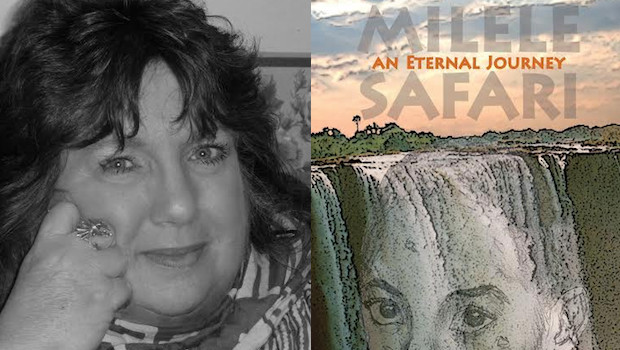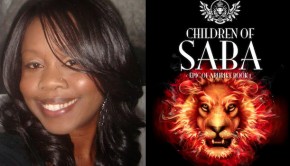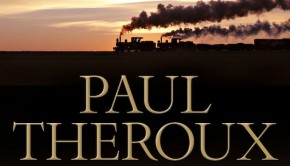Author Pitch: Milele Safari: An Eternal Journey by Jan Hawke
Sub-Saharan Africa, the setting for Jan Hawke’s debut, Milele Safari, couldn’t be more different from her home in rural Cornwall. The structure of the novel, which explores the aftermath of genocide, was loosely inspired by The Canterbury Tales, and the writing process turned out to be a therapeutic journey for the author herself.
Tell us a bit about yourself:
Straight off my blog before I bore myself — I live near Launceston in Cornwall, UK with husband Pete and Toby and Benji the Springer Spaniels. It’s a tie between the boys as to who’s maddest, but as I outrank all of them in being weird anyway it’s not really open to debate. Due to ill health I retired early from an IT career in the publications unit of a central government civil service office. These days, I regret to say, I’m physically lazy with things that don’t hold much interest for me (so that’s mostly housework and, increasingly, cooking…) but writing and messing around with graphic art to keep my hand in is still something I enjoy immensely. However, I do love where we live, mainly because I chose it for being so quiet and off the beaten track, very close to the moors and quite near to the sea. Great for mood writing and for the lack of passing trade and callers that living in the country is all about.
Who are your favourite authors?
I love to read all sorts of books and it can get very eclectic genre-wise (I enjoy Julian Barnes, Kate Atkinson, Jeanette Winterson and will happily admit to Jilly Cooper too) but in the main I’m heavily into SF&F, particularly Tolkien, Terry Pratchett and Julian May, although I can pass on Zombie Apocalypses fairly easily…
What book are you reading now?
Right now I’ve got a self-imposed reading list with other authors that I’ve met online for review swaps which are a mixture of genres with a strong SF/Fantasy bias, but also some murder mysteries and romance. For pleasure I’m slowly wending my way through the set of A Song of Ice and Fire series instead of salaciously watching it on the TV (I’d only read Game of Thrones before, back when it all started, so I’m still a book canon newbie). I’d forgotten how young some of the main characters were, but I do admire George RR Martin’s gritty take on fantasy, with ‘real’ people who have plausible horrible lives even when they can do magic.
However my current read is The Long War by Terry Pratchett and Stephen Baxter which is the second book in a trilogy (book 3, The Long Mars isn’t out yet). Huge fan of Terry’s and I’ve also exchanged big smiles with Stephen Baxter in the corridors of the Discworld Convention hotel in 2010. The series makes for interesting reading as the style is obviously a fusion, but it’s definitely science fantasy and speculative, verging on prophetic, fiction of the type that I really admire. I’m on the positive side of fan reaction as I don’t need Terry to be writing satirical fantasy the whole time and I am enjoying the conceptual side of the Long Earth series very much, particularly the humanoid aspects.
What made you sit down to write Milele Safari?
What a question! Several triggers, but the main one came after the major mental breakdown that caused me to leave gainful employment. I’d started writing it before that in a haphazard kind of way about seventeen years ago with the idea of a loosely themed series of ‘glory’ moments, of which only a few made it into Milele. After I began to slowly recover, I found that writing was a very therapeutic pastime — I had joined a Tolkien fan forum and was getting into pen and paper roleplay and writing fan fiction. When that only went so far I turned to my scribbled notes for the ‘glory tales’ and looked at something else I’d started to pen on our last safari holiday in Zambia. That was an embryo outline for the chapter of Watching, that followed a she-leopard and her cubs and that’s when I realised that a lot of my really happy or memorable times had happened in Africa.
Watching wasn’t exactly one of my magic moments, but it was very special memory, along with a libidinous reaction to Victoria Falls and several emotionally heady experiences on or around Lake Kariba, so really the decision to write about Africa almost made itself under the working title of The Safari Tales. There was a pilgrim aspect to it as well (I really had been very ill and needed to claw my way back to a semblance of healthy balance) so The Canterbury Tales was also a motif for me as Sophie, Harry and their companions told or remembered their stories around the camp fires.
Tell us a bit about the plot:
Essentially it centres on Sophie Taylor’s early experiences as an assistant teacher with a relief organisation and how her life is ruined by her fiancé’s murder in fictional Zyanda, in the fallout of the tribal genocide being perpetrated there. It skips around in time and a lot of the story is told in flashback thirteen years later when Sophie, re-trained as a doctor, returns to the Zyandan-Tanzanian borders to work as a clinician and psychotherapist in an experimental community settlement for the rehabilitation of the victims of war and violence, but also offering them a new future as empowered participants in fair trade agriculture and with wildlife and eco-conservation tourism.
Because she was initially sceptical about returning to work for an aid agency, Sophie’s sister, who runs an upmarket safari tour company, hits on the idea of easing Sophie back with a working holiday as the medical attendant for a group of Hollywood movie-makers out on a jolly in Southern and East Africa before starting a re-make of The African Queen. That helps set up the backdrop of actual and perceived attitudes towards ‘natural world’ Africa, before Sophie moves on to confront and overcome the darker aspects of war and colonial and cultural abuse that permeates modern Africa, through the people she encounters on safari and in the community she is to join.
In the introduction to the book you acknowledge you’re obsessed with fantasy fiction, what made you decide to write in another genre?
For someone obsessed with fantasy I do like it to be as realistic as possible — I did mention that I was weird didn’t I? I like it to work and make sense, hence the fondness for Discworld with its reflection of this world in the way people behave towards each other and justify themselves. George RR Martin, who I’m beginning to think of as the contemporary Tolkien, also appeals to me with his gritty take on fantasy, with ‘real’ people who have plausible, horrible lives even when they can do magic. I do also slip in some sneaky mythology and folklore bits here and there with the references to Imana and Nyaminyami who are respectively creator and afterlife spirits, the witch-smellers, and with the talking rhinos and dik-diks in Onwards and Upwards.
Really all fiction carries elements of fantasy, just as our own internal lives fly away in dreams and fancies and also how we resolve them in the waking world. We all have to be our own hero — being ill made me realise that and pushed me into beginning my own ‘forever journey’ by taking myself seriously as a writer. So Milele isn’t just contemporary, or even literary fiction, because it has several cerebral and emotive facets and is in some respects ‘epic’. I certainly had a hard time choosing which genres to saddle it with when I did all the formalities for the ISBN and putting it up for sale online.
How did you go about researching your book?
Some of it’s from personal experiences; like blaming yourself for a miscarriage or watching snowy egrets float up into the air, imitating snow-flakes before settling back onto buffalo backs. Others are down to the re-spinning of tall tales and hilarious anecdotes around a safari campfire. The putsi fly part is 100% authentic — I swear the little… maggot woke me up when it bit into my flesh right next to my navel. I still have the scar to prove it where my husband had to tweeze it out from its air hole!
For the Biafran and Zyandan atrocities it was mixture of online research, mostly on the BBC News Archives where some insights into the mutual hell of the victim-murderer dynamic, and with being buried alive under corpses comes from. For the Teresa Olatunde backstory however, I drew almost all of the abuse storyline on my experiences working as a courtroom clerk in the High Court during the aftermath of the Cleveland Report and late ’80′s rent boy scandals. What was surprising about that was that I had dreaded having to write it, but when it came to putting fingers on the keyboard I actually wrote Teresa’s coma hallucinations in a three hour ‘gush’. Same thing with most of The Acts of the Apostles, but there I talked to an EMDR therapist who also practises dramatherapy and who gave me some fascinating background material for the treatment of PTSD sufferers.
My ongoing struggle with chronic depression was also a useful source for contextual ‘misery’ for writing David Mukuga and Verity Beleshona, but I also did some literary and cinematic research by reading true-life memoirs Emergency Sex (and Other Desperate Measures) by former UN workers Ken Cain, Heidi Postlethwait and Andrew Thomson, and from watching Hotel Rwanda dozens of times. Again, I found it surprisingly easy to get into the vulnerable head of a fifteen year old serial killer and how he might deal with his own self-hatred and condemnation or, with Verity, survivor guilt and workaholism.
Why did you decide to self-publish, and how are you marketing your book?
Because I’m lazy and don’t handle rejection too well. Not entirely true, because I did approach about a half dozen carefully selected literary agents with mixed results, some of whom actually replied with a polite ‘no’. I always knew it would be hard to pitch the book because it’s such a medley of approaches with several viewpoint characters and some folklore and mysticism thrown in the mix – the whole point of it being about Africa is that it’s not any one thing.
Also, although I purposefully chose a variety of people with different literary tastes to beta-read it for me (and who nearly all found something to enjoy in there), I knew it would be a hard book to read in places in view of some of the subject matter. Because of that, for someone who’s new to the fiction side of publishing it was always going to be difficult to pitch to a niche audience because it’s such a mixture of scenarios and emotional content. I couldn’t say it’s chick-lit, or a war thriller, or a fictional misery memoir, although there’s elements of all those in there, so I guess I wasn’t brave enough to put myself through the rejection mill for too long.
But mostly I opted to self-publish because of my background in publications and because I still had all the software, design and editing tools to produce creditable print and ePub editions all on my ownio. Also I joined LinkedIn and met some highly skilled self-publishers on there who put me on to some reputable and very professional POD and distribution providers, who made all the bits that I couldn’t navigate for myself extremely stress-free as well as easy(ish) on the pocket.
Really I’ve had a ball being in sole charge of how my book got published and, even if sales never go too far into profit, I’m hooked on doing it myself from now on. As for marketing — well not quite so keen but I’m successfully combating a deep-seated reluctance to indulge in social networking and have recently embraced blogging. This interview is in itself a giant leap for me — and getting minor kicks from it, so I guess I’m gradually coming out of my PR comfort zone OK.
Imagine your ideal reader: which authors do they enjoy?
This is the really hard one! Widely-read hopefully, because of the scope of the storylines. And a reasonably strong stomach would help with some of the darker bits too. Being a first-time novelist I think it’s inevitable that you default to material you know fairly well and that includes writing styles, so there’s a personal bias in there. I’d like to think that my readers might also enjoy work by Wilbur Smith and Desmond Bagley, Rudyard Kipling and Jane Austen, Kate Atkinson and James Herbert in places. I really admire evocative writing and great characterisation, and hope that I’ve also achieved this.
If you had to sum up your book in a Hollywood pitch, how would you describe it?
How about Dr. Bridget Jones goes on safari with Allan Quatermain before checking into Hotel Rwanda to run a psychotherapy clinic for victims of PTSD?
If the book were to be adapted for film or TV, who would play Sophie and Harry, the main characters?
Well — for Sophie it would be Renée Zellweger perhaps? She can do cerebral blondes and home counties English accents pretty well. Interesting that you say Harry is a main character, although he is a central focus point — I’m stalling because I hadn’t really thought about casting him. I suppose I was thinking Stewart Granger while I was writing him — King Solomon’s Mines etc… OK – I’m going for Rupert Everett (narrowly over Jeremy Irons) for the macho-gay quotient?
What do you want readers of Milele Safari to take away from reading the book?
A sense of ‘being there’ I think. A recent reviewer said they thought I’d poured heart and soul into the writing and the reason for that was because I wanted to get across the ambiguous, frustrating enthralment Africa casts over outsiders. Also the human aspects of having to live in such extremes of wealth and poverty, beauty and travesty — in most respects the book is about what it means to be human and all that entails, even though I’ve never held a gun or physically harmed another person or animal. Life is a journey. The passion is forever. It’s all in the title.
Buy Milele Safari (ebook and paperback)
Visit the book’s official website
The Omnivore helps readers discover the best indie authors. If you would like to be featured on Author Pitch email authorpitch@theomnivore.com










